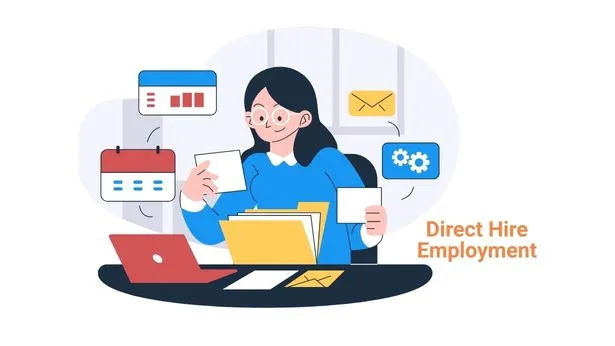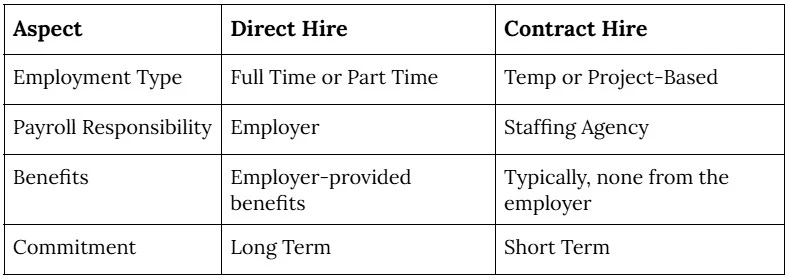What are Direct Hires? A Guide for Employers
If you are thinking “What are direct hire employment?”, you are certainly not the only one. Employers are often faced with either hiring employees to fill their direct hire openings or hiring contractors. By understanding the differences with direct hire employment, employers will have a better understanding when making choices that are best for their business.
This blog will offer a breakdown of what direct hire employment is and the difference between direct hire vs. contract hire, the advantages of hiring employees for direct hire employment, explain how direct hire employment works, and explore the direct hire recruiting process.
What is Direct Hire Employment?

Direct hire employment is when an employer hires an employee directly as a part-time or full-time staff member with no intermediary or temporary agency. An employee hired into a company directly is part of the company’s workforce permanently and will not generally be able to solicit work from the company on their own.
Generally, direct hires are brought into the company with a long-term view of integrating them into the company culture and operations. There is more of a desire to install some longevity versus a contract or temporary hire to build a stable and long-term workforce.
Direct Hire vs Contract Hire: Understand the Differences
One of the most common questions employers ask is the difference between direct hire vs contract hire. Here’s a quick comparison:

Benefits of Direct Hiring for Employers
Understanding the advantages of a direct hire for employers is important for choosing how to recruit, especially when you have options to consider for direct hire vs. contract hire. Here are a few of the advantages:
1. Higher Employee Loyalty and Retention: Direct hires have higher loyalty because of their permanent and benefits status, which can result in a lower turnover rate.
2. A Better Cultural Fit: Employers can spend time attracting an applicant who fits within their company values and team environment, which is easily done when directly hiring compared to contract hires.
3. Better Efficiency: Direct hires are typically more efficient with time as they become more familiar with tools and processes related to the company’s long-term goals.
4. Overall Cost Efficiency: Although the initial costs of hiring directly are typically more expensive than opting for a contract hire, direct hires can translate into overall savings and efficiencies long-term when you factor in the cost of onboarding or repeatedly paying search or agency fees for temporary or contract workers.
5. Legal and Compliance: Employers are in full control of how an employee’s employment terms are arranged and hired, giving the employer peace of mind that they may not get with possible variations that can arise in contract hiring arrangements, which can still have legal compliance issues or problems associated.
How Direct Hire Works: Step-by-Step Process
Understanding what direct hire means is important for businesses making recruitment choices.
1. Job Analysis and Job Description: When deciding between a direct hire and contract hire, the first step is to do a job analysis to identify the position, responsibilities of the position, and qualifications for a permanent employee.
2. Sourcing Candidates: Employers go to job boards, companies’ websites, social media, and recruiting agencies to source applicants who are looking for what direct hire employment means.
3. Screening and Interviewing: Review resumes, conduct interviews, and consider candidates based on skills, fit within capabilities, and benefit from direct hire for employers to consider candidates’ long-term potential.
4. Background Checks and References: Confirm employment histories, credentials, and references to verify the candidate is reliable and competent to hire.
5. Offer and Negotiation: Provide the candidate with a formal job offer, discuss compensation, and agree to employment terms to make the candidate a permanent hire.
6. Onboarding: To make the hire successful long-term, orientation, training, and mentoring will integrate the new hire into the organization.
Direct Hire Recruiting Process: Best Practices
A direct hire recruiting process that is working well makes sure the appropriate talent has been matched to the needs of your organization. Here are some practices to guide your process:
1. Work with Specialized Recruiters: Specialized recruiters can locate candidates more quickly and accurately than general recruiters and search firms.
2. Use Technology to your Advantage: Managing resumes, initial communication with candidates in a recruiting software or applicant tracking system (ATS) can help streamline your hiring process.
3. Think about Your Employer Brand: Use social media and employee testimonials to create and communicate your company culture to secure new talent.
4. Involve the Hiring Managers from the Beginning: Ensure the right talent is assessed for the right technical fit, as the hiring Managers’ assessments are necessary.
5. Make Competitive Offers: Know what competitive offers are being made in the current market to ensure you are making competitive offers.
Also Read: How AI is Redefining Recruiting
When Employers Should Choose Direct Hires
In the direct hire recruitment process, you should first consider direct hire vs. contract hire based on your hiring objectives and needs. In general, direct hire provides the best option when:
1. You Need Long-term Employees: Permanent hires through the direct hire recruiting process are more likely to take a vested interest in the company’s success and are suitable candidates for growth-focused roles.
2. The Role Requires a Deep Knowledge of the Company or Specialized Skills: In many cases, roles that require a deep understanding of your processes will lean towards a direct hire vs. contract hire decision.
3. You Want to Develop a Strong Culture: Direct-hire employees will take more time to build familiarity with the company’s values and fit into the team, but will also help develop the firm’s workplace culture.
4. You Value Stability and Employee Retention: Permanent roles help to minimize turnover and drive loyalty, both of which are valuable benefits of a direct hire for the employer.
Final Call on Direct Hires
When employers understand what is meant by direct hire employment and how it differs from contract hiring, they can make more informed staffing decisions. From the employer’s perspective, the benefits of direct hire are loyalty from the worker, productivity, and potentially long-term cost savings for the employer. When an employer understands how direct hire works and can develop the direct hire process, they will be able to hire the best available talent that relates to their company’s goals.
Ready to find the perfect full-time employees for your company? Contact Time Agency Group, a leading tech employment agency, and start optimizing your direct hire recruiting process today for long-term success.
FAQs about Direct Hires
Q1. What is direct hire employment?
Direct hire employment means hiring as ongoing, permanent, direct employees, rather than as agencies or contractors.
Q2. What is the difference between direct hire and contract hire?
Direct hire employment is ongoing, whereas contract hire employment is temporary, typically through staffing agencies.
Q3. What are the reasons for employers to use direct hire?
Reasons for employers to use direct hire include higher employee loyalty, better fit into the culture, productivity, and long-term cost savings.
Q4. How does direct hire employment work in practice?
Direct hire employment involves posting the job, sourcing candidates, interviewing, background checks, offering the position, and onboarding, for example.
Q5. What does the direct hire recruiting process involve?
The direct hire recruiting process involves defining the roles of the job, sourcing the candidates, screening applications, interviewing candidates, and other formal hiring roles.
Q6. What are the reasons for using direct hire, rather than contract hire?
If the plan is for an organization to hire employees for permanent roles, to hire for building culture within the organization as an employer brand, to hire and retain employees, direct hire is the better choice than contract hire.
Q7. Can a direct-hire employee who is hired from a contractor become a direct hire?
Yes, many companies change the status of contract workers to direct hire after ensuring that they are a good fit for the role and assessing their performance.
Q8. Is it more expensive to use direct hire rather than contract hire?
The direct hire process can involve more upfront costs, but is typically lower cost on an ongoing basis than contract hire in the long term.
Related Article: Direct Hire vs Contract Hire: Which Is Better for You?






